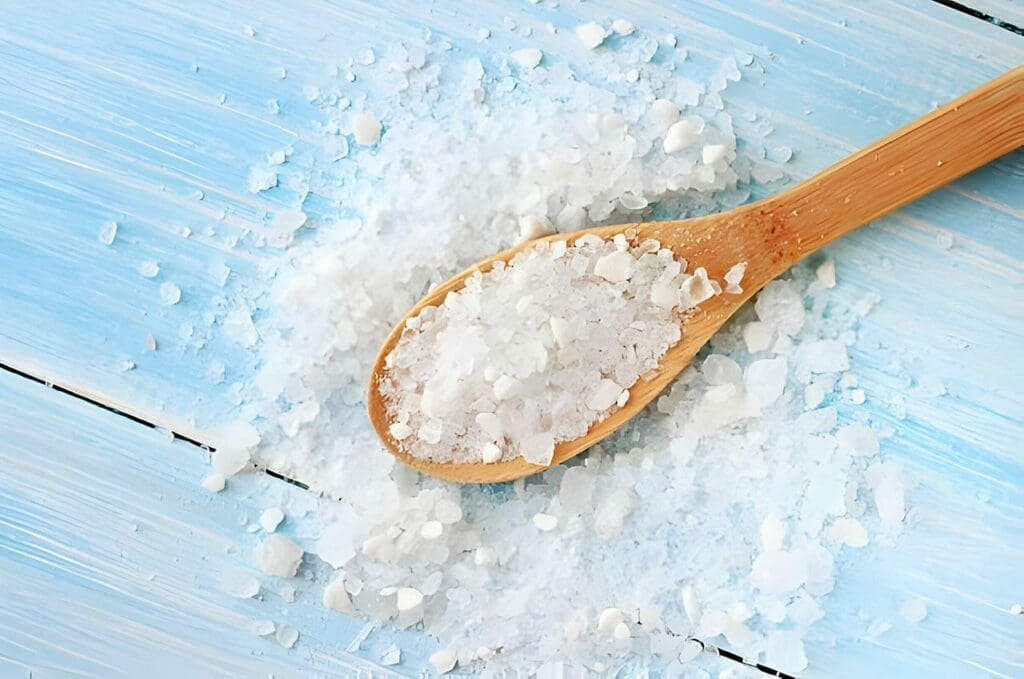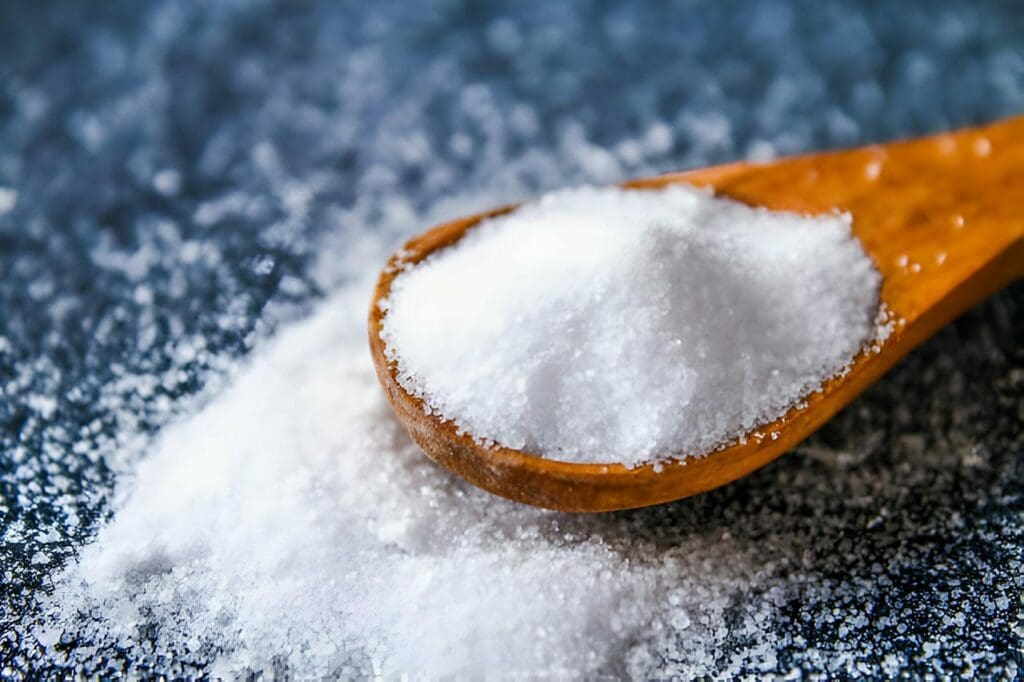Imagine your backyard as a battlefield, with weeds relentlessly pushing through the cracks in your pristine patio.
You’ve heard whispers about salt being the ultimate weed assassin, but does it truly deliver the fatal blow?
Before you sprinkle that common kitchen staple on your garden foes, let’s unpack the truth behind salt’s weed-killing powers and whether it’s a friend or foe in your war on weeds.
The Science Behind Salt Weed Control
When salt is applied to weeds, it disrupts the osmotic balance within the plant cells, ultimately leading to their dehydration and death. This process involves complex chemical reactions within the plant physiology. Salt, primarily composed of sodium chloride, when in contact with plant tissues, causes water to move out of the cells due to osmosis.
Osmosis is the movement of water from an area of low solute concentration to an area of high solute concentration through a semi-permeable membrane. In this case, the high salt concentration outside the plant cells draws water out, causing them to shrink and wither.
The disruption of the osmotic balance triggers biochemical reactions within the plant. As water leaves the cells, essential processes like photosynthesis and nutrient transport are hindered. Additionally, the high sodium levels in the plant tissues can interfere with enzyme activities, disrupting vital metabolic pathways. Ultimately, the combined effects of dehydration and chemical interference lead to the demise of the weeds.
Pros and Cons of Using Salt

Using salt for weed control presents advantages and disadvantages that must be carefully considered.
One benefit of using salt is its cost-effectiveness. Salt is a readily available and inexpensive product, making it an attractive option for many individuals looking to control weeds. Additionally, salt can effectively kill various weeds, including stubborn perennial ones, even Japanese knotweed. Its ability to dehydrate plants by drawing out moisture can lead to successful weed eradication.
However, there are significant risks associated with using salt for weed control. One major disadvantage is the potential harm it can cause to surrounding vegetation. Salt can deplete soil nutrients and alter its composition, making it challenging for desirable plants to thrive. Furthermore, the excessive use of salt can lead to soil salinity, negatively impacting soil fertility in the long term. Additionally, salt can leach into water sources, posing environmental risks.
Best Practices for Applying Salt
To ensure effective weed control while minimizing potential harm to surrounding vegetation, it’s crucial to apply salt precisely and specifically. When considering salt concentration, it’s important to use an adequately strong solution to kill weeds but not so strong that it damages other plants. A concentration of 10-20% salt in water is typically effective for weed control. Assess the weed infestation level before applying the salt solution to determine the appropriate concentration.
Application timing is another critical factor to consider. It’s best to apply salt when the weather is dry to prevent the salt solution from being washed away by rain. Applying salt during the day’s heat can enhance its weed-killing effects as the sun helps dry out the weeds after salt application. However, be cautious when applying salt during hot weather as it can also harm desirable plants due to excessive evaporation.
Environmental Impact of Salt Use
Considering the implications of salt application for weed control, evaluating the environmental impact of salt use on surrounding ecosystems is imperative. When salt is used excessively for weed management, it can lead to soil contamination and plant toxicity. High salt levels in the soil can disrupt the balance of nutrients, making it challenging for plants to absorb essential minerals, ultimately affecting their growth and survival.
Moreover, salt runoff from treated areas can result in water pollution, posing a threat to aquatic life and overall ecosystem health. Excessive salt in water bodies can harm aquatic plants and animals, disrupting the ecosystem’s delicate balance. Ecosystem damage can occur when salt accumulates over time, affecting not only flora and fauna but also the overall biodiversity of the area.
Therefore, while salt can be an effective weed control method, its environmental impact should be carefully considered to prevent soil contamination, plant toxicity, water pollution, and ecosystem damage. It’s crucial to explore alternative weed management strategies that minimise these negative effects on the environment.
Alternatives to Salt for Weed Management
When seeking alternatives to salt for weed management, it’s essential to explore environmentally friendly options that effectively control weeds without causing harm to surrounding ecosystems. One effective alternative is using vinegar for weed control. Vinegar, particularly horticultural vinegar with a higher acetic acid concentration, can be a natural herbicide. When applied directly to weeds, the acetic acid in vinegar can desiccate and kill the unwanted plants. It’s important to note that vinegar can also affect surrounding vegetation, so care must be taken during application.
Another alternative to salt for weed management is steam treatment. Steam treatments involve using high-temperature steam to kill weeds, causing plant cells to burst. This method effectively controls weeds in areas where using herbicides or manual removal isn’t practical. Steam treatment is considered environmentally friendly as it doesn’t leave behind harmful residues in the soil and is safe for surrounding plants and organisms.
Both vinegar solutions and steam treatments offer effective alternatives to salt for managing weeds while minimizing environmental impact.
Frequently Asked Questions

Can Table Salt Be Used to Kill Weeds, or Does It Have to Be a Specific Type of Salt?
Table salt can effectively kill weeds when used at a high enough concentration. However, it can harm the environment and soil health. Consider alternatives like vinegar or boiling water, which are more eco-friendly options for weed control.
Will Using Salt to Kill Weeds Affect the Ph Levels of My Soil?
Using salt to kill weeds can affect your soil’s pH levels. This alteration can impact soil fertility and have environmental consequences. Understanding the potential effects on soil pH is vital when considering salt for weed control.
How Long Does It Take for Salt to Effectively Kill Weeds?
Consider the timeline and proper application techniques to kill weeds with salt effectively. Understanding the effectiveness timeline is crucial. Apply salt directly to weed roots for best results. Focus on precision to minimize soil impact.
Can Using Salt to Kill Weeds Harm Beneficial Plants or Organisms in My Garden?
When using salt to kill weeds, be cautious about the soil impact and potential harm to beneficial plants. Consider plant sensitivity and apply salt carefully to avoid environmental concerns. Choose application methods wisely to minimize unintended consequences.
Are There Any Safety Precautions I Should Take When Using Salt for Weed Control?
When using salt for weed control, take safety measures seriously. Protect yourself with gloves and goggles. Apply salt directly to weeds carefully to minimize environmental impact. Consider effectiveness and potential harm to other plants.
Final Words
In conclusion, while salt can be an effective weed control method due to its ability to dehydrate and kill plants, it also poses risks to soil health and nearby vegetation. It’s important to consider the environmental impact and use alternatives for sustainable weed management.
Understanding the science behind salt weed control, weighing the pros and cons, and following best practices, you can make informed decisions for maintaining a healthy and thriving garden ecosystem.




